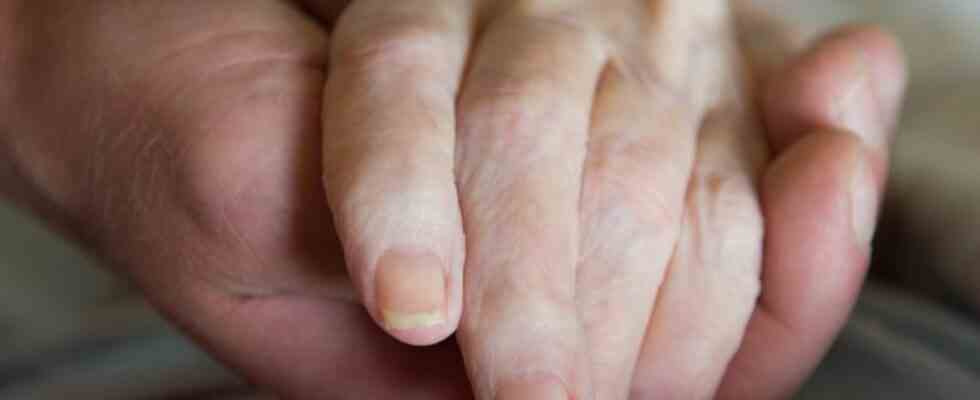ethics
Bundestag is struggling to reorganize euthanasia
A nurse holds a woman’s hand in a nursing home. The Bundestag has dealt with concrete proposals for the regulation of euthanasia in Germany. Photo: Sebastian Kahnert/zb/dpa
© dpa-infocom GmbH
Two years ago, Karlsruhe overturned the ban on euthanasia as a service. A new law is now being discussed. The ideas collide.
The members of the Bundestag debated a possible new regulation of euthanasia in Germany in a serious and emotional manner.
In the first reading on Friday, three cross-party drafts were introduced into the legislative process. The drafts are now to be discussed further in the Bundestag committees.
Several MEPs supported a group motion that would make commercial promotion of suicide a criminal offence. There should be an exception for adults. Suicide prevention should be strengthened. It should not be perceived as a normal means of ending life, said CDU MP Patrick Schnieder, who spoke for this group. “We want to prevent that,” says Schnieder.
«High hurdles for commercial suicide assistance»:
The SPD MP Heike Baehrens spoke out in favor of “high hurdles for commercial suicide assistance”. She said: “Dying is not easy, bringing about death must be harder.” At the same time, Baehrens campaigned for respectful treatment in the further debate.
Katrin Helling-Plahr (FDP) advocated a more far-reaching draft law. The right to a self-determined death should be secured by legislation. It should be made clear that “assistance in suicide is possible with impunity”, according to the draft.
“I would like those affected to give every helping hand in the advice centers,” said Helling-Plahr. “But if they decide they want to go, we can’t leave them alone.” Then there shouldn’t be a raised index finger. Rather, those affected should be helped. The FDP politician warned against the creation of a new criminal offense in this area.
The SPD deputy Helge Lindh, who also spoke for this group, gave the example of a 90-year-old woman, “whose husband had died, who was also very ill (…), locked herself in, shared it and starved to death ». Such cruel cases must be prevented.
Draft Access to Narcotics:
Another group, including the former Green Federal Minister Renate Künast, had presented the draft of a “law to protect the right to self-determined dying”. It aims to give those affected safe access to certain narcotics.
Lukas Benner (Greens), among others, spoke in favor of this application. Today, euthanasia often takes place in a gray area, with the help of a “legal loophole” and often without adequate advice, said Benner. The situation cannot stay like this. A difference to the Helling-Plahr draft is that not only doctors should be involved in the event of a wish to die, but also an authority.
The judgment of the Federal Constitutional Court:
In 2020, the Federal Constitutional Court overturned a ban on repeated euthanasia. The Karlsruhe judges worked out a right of the individual to self-determined death. The then court president Andreas Voßkuhle made it clear: “This right includes the freedom to take one’s own life.”
In December 2015, lawmakers banned euthanasia as a service. Up to three years imprisonment were planned. Professional euthanasia professionals who provide lethal drugs or organize a dying apartment should be put on hold. Seriously ill people who had trusted in the support of Euthanasia Germany and other suicide helpers were also affected by the ban.
Consequences of the verdict:
When the people of Karlsruhe overturned this ban, they found that without the possibility of seeking help from third parties, the right to self-determined dying would be “actually largely emptied”. Active euthanasia – i.e. killing on request – remained prohibited. After the verdict, doctors were still not obliged to provide suicide assistance – but since then they no longer have to fear criminal prosecution.
The verdict opened a door for organized offers. However, the judges saw a “broad spectrum of possibilities” for regulating euthanasia. What a new regulation might look like is now the subject of further parliamentary deliberations.

